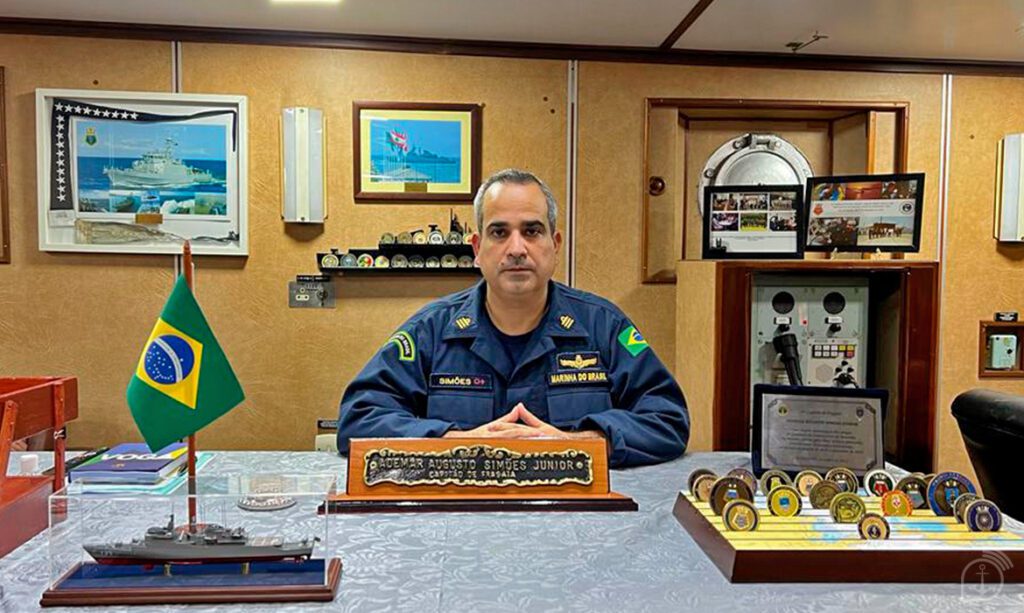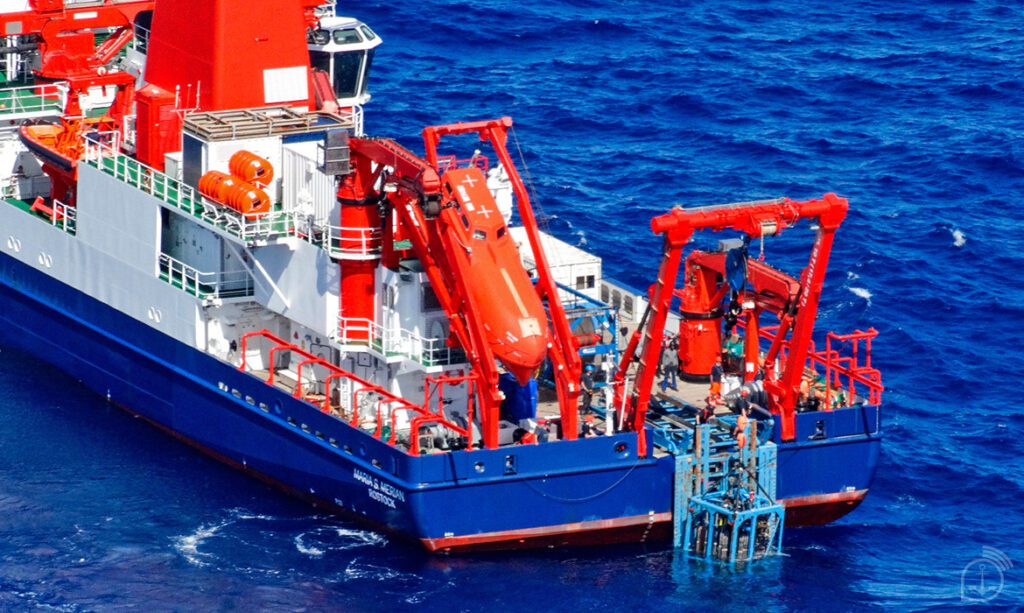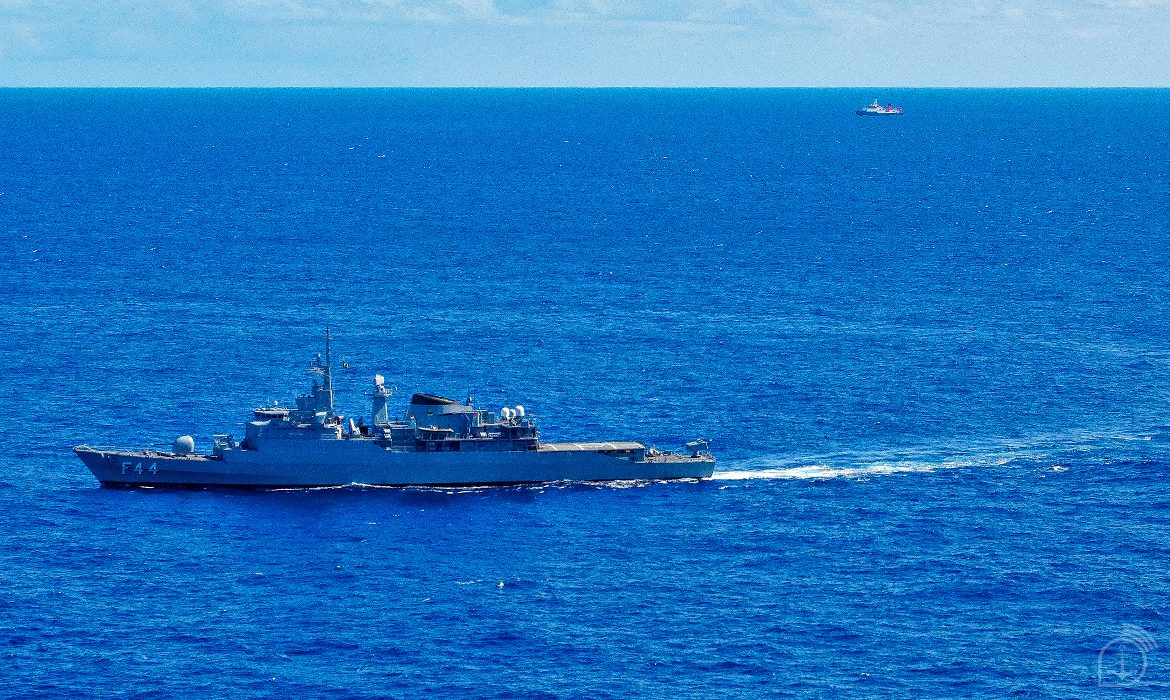In an interview, the Commander of the Frigate “Independência” explains the importance of this monitoring
By Lieutenant-Captain (RM2-T) Camila Marques – Brasília, DF
In an interview to Agência Marinha de Notícias, the Commander of the Frigate “Independência”, Frigate Captain Ademar Augusto Simões Junior, talks about the importance of naval patrol and what are the purposes of this monitoring in compliance with the national legislation on Brazilian Jurisdictional Waters. In addition, he answers about a recent boarding carried out on a research vessel flying the German flag.

Commander Simões, can you explain what is a naval patrol?
The naval patrol is a subsidiary attribution, particular to the Brazilian Navy, whose purpose is to implement and enforce compliance with laws and regulations, in Brazilian Jurisdictional Waters [AJB], on the Brazilian continental shelf and on the high seas, respecting the international treaties, conventions and acts ratified by Brazil. It is conducted by naval means, with the use of organic vessels and aircraft to support its activities, and there may be the reinforcement of marines or combat divers on board naval means, especially when visiting and inspecting, for the benefit of security and approach with opposition.
How is it defined which ship will carry out a patrol mission? More than one means is used?
Naval patrol will be conducted using naval means that: have a commander legally designated by constituted authority and a crew submitted to the rules of military discipline; have fixed armament on their decks; and exhibit exterior signs that are characteristic of ships, vessels and aircraft belonging to the Brazilian Navy. Depending on the area of action that you want to perform the naval patrol, a larger ship, such as a frigate, can be better employed, because one must take into consideration factors such as time x distance, the speed you need to be in the area of action, and the ability to remain there for prolonged periods.
How is the planning and organization of the ship’s crew before going out on naval patrol?
Through exercises that are conducted in port and at sea, the ship’s crew is always in condition to be employed on a naval patrol.
What are the risks to be considered during a boarding?
During a boarding one can expect a cooperative or non-cooperative reaction from the person being boarded. In the case of a non-cooperative approach, the risks involving the safety of the personnel must be planned and the rules of engagement very well defined so that, if necessary, within the legal parameters, the gradual use of force can be employed.
The Navy has the police power to conduct which actions?
A ship on naval patrol, for example, may exercise and develop law enforcement activities, which are characterized as administrative police power and are concretized in the cohibition of illicit conducts that concern the occurrence of crimes that may take place in Brazilian Jurisdictional Waters and on the high seas.
In one of the last naval patrols of the “Independence” Frigate, in the Rio Grande Rift area, a foreign ship was boarded. Where was it from and what was this ship doing in Brazilian waters?
It was a research ship flying the German flag. When asked what activity it was carrying out or would carry out in that area, the answer was that it would start to collect samples from the subsoil in order to carry out scientific research.

What actions were taken by the Brazilian ship that made the approach?
The foreign ship was asked to immediately cease research activities in the subsoil in the area of the Rio Grande Rise. The organic aircraft on board the Fragata “Independência” was also used in order to register some images of the research device that was going to be used to collect the samples from the subsoil. Immediately the foreign ship terminated its research activities in the Rio Grande Rift and withdrew from this area.
Based on the United Nations Convention on the Law of the Sea, concluded in 1982 in Montego Bay, Jamaica, articles 76 and 77, and the interpretation of the International Seabed Authority, the exploration rights on the extended continental shelf are exclusive to the Coastal State, from the moment it submits its claim to the United Nations Commission on the Limits of the Continental Shelf.
In 2018, Brazil submitted the proposal to extend its continental shelf, including the area known as the Rio Grande Rise, to the Boundary Commission, and that it currently exercises the right of sovereignty over this area, for the purpose of exploration and exploitation of its natural resources.
Thus, no foreign-flagged vessel may conduct any type of research or scientific investigation on the seabed or subsoil in this area, known as the Rio Grande Elevation, without authorization from the Brazilian State.
What are the differences between boarding a Brazilian vessel and a foreign one?
In order to carry out an inspection or arrest a foreign-flagged vessel, it is necessary for the Brazilian State and the country whose flag the vessel is flying to enter into negotiations.
What does the action taken by the Brazilian Navy represent for Brazilian sovereignty?
The action of the “Independência” Frigate is important for the maintenance of Brazilian sovereignty and the protection of national wealth in the Blue Amazon. The action also demonstrates the application of basic characteristics of Naval Power, such as mobility and permanence, which, when fully exercised, were fundamental to dissuade the intentions of another nation without the proper authorization from the Brazilian government.
Source: Agência Marinha de Notícias
